This article is the first of the Better Biopunk series, an attempt to push the synbio-inspired genre towards a more optimistic aesthetic.
What are the Punk genres?
Basically, the punk genres are about taking the technology of a given time period or field and stretching it out to fantastical levels. There is contention on this point because many believe punk genres should also be about rebellion, social alienation, and sticking it to the big government. But while that is true, the fact is, a lot of work in these genres don’t do that anymore. Instead, they act as aesthetics people adopt and strive towards (in terms of fashion, interior design, notion template vibe, etc). They behave as vessels for collections of speculative design. The punk genre was popularized by cyberpunk which had a very distinct aesthetic of techno futurism and dystopian technology, asking the central question of “what does a dystopian future taken over by technology look like”?
My younger sister and I are both science-art enthusiasts so one night we were having a conversation trying to find out which aesthetic we each fell into. We zeroed in on hers immediately - she was solarpunk to the core, a genre characterized by its optimism, focus on sustainable energy, and earth-toned clothing. Upon exploring the other sci-fi categories though, we stumbled across biopunk. On paper, it sounded perfect: “the subgenre of science-fiction that focuses on biotechnology”? Sign me up! It literally mentioned synthetic biology (the major I want to pursue in college) by name in the description too.
But upon further exploration, I was struck with dismay.
Biotech and Science Fiction, the problem with our art
I honestly think that our fictional counterparts are quite ugly. I scrolled through Reddit forums, Pinterest boards, books, movies, and found that positive representation of genetic engineering in fiction is very minimal. I love gore and horror as much as the next person does, but it’s quite clear to see that we’re overdoing it a little with biopunk. For a genre that’s supposed to represent the implications of biotechnology, it’s currently unbalanced, skewing a little too far towards the negative and dystopian.
Biopunk is a subgenre of science fiction that deals with the intersection of biology and technology. This can be anything from genetic engineering to cybernetics, and often explores the implications of these technologies on society and the individual. Biopunk fiction often has a DIY, punk aesthetic, and is often critical of the way that technology is used and controlled by corporations and governments. This makes it a perfect genre for stories that are both entertaining and thought-provoking. However, biotech portrayed in mainstream media is also almost always associated with negativity, ( ex. Annihilation, Resident Evil) - beautiful, but terrifying. We have horror movies like Splice. TV shows like Orphan Black and Biohackers were enjoyable but super creepy.
When we google biopunk, the results page shows only horror bio-gore. When held in comparison, cyberpunk at least had a visually appealing aesthetic to strive towards. As a genre, cyberpunk also skews negative but it’s also a lot more balanced than its biological counterpart. Okay yeah cyberpunk has Terminator, Blade runner, etc. and the core theme of the genre explores the dehumanizing and brainwashing effects of hard capitalism on individuals, but it also has you know - back to the future, so many cool applications of tech, marvel, everywhere to complement it. And most importantly, when you search it up on google, it doesn’t look intentionally revolting, it looks kind of cool.
As a GenZ-er, I can tell you right now that doing things “for the aesthetic” is a reason many people do what they do nowadays (and not even ironically!). We are living in a very aesthetically motivated world.
With Biopunk, we don’t even have aesthetics going for us! I wholeheartedly believe that most people would think that it is conventionally unattractive at first glance, the sickly green color that seems to characterize each piece is unappealing. Boo. My 14-year-old sister says that it makes her throw up. She can’t even look at the google page. Admittedly, some might like this current style, finding it thought-provoking or edgy, or cool, and I respect that. To some extent, I even agree. I love lots of biopunk films and literature. But I sincerely believe that it isn’t fulfilling its full potential as a genre in the slightest.
I’m not the first one to protest this lack of differing perspectives. People are starting to notice the lack of high-quality positive biotech-inspired science fiction.
If people are constantly exposed to media that confirms that the field’s all about creating evil monsters, evil GMOs, Biopunk might inadvertently become a self-fulfilling prophecy, subconsciously discouraging interest in pursuing careers and supporting innovations that involve biotechnology.
What Biopunk could be
The Arts and Bioethics network maintains the belief that the arts enrich bioethics due to its abilities to open new and creative approaches to framing bioethical concerns (Macneill and Ferran, 2010, p. 71). Evidently, the manner in which biotechnology is represented within literature, film, and the arts significantly affects public response toward science and its mainstream perception (Caulfield, 2004, p. 213).
We should be able to look at biopunk more positively and reframe it as a genre where genetic engineering, like tech, can be a force for GOOD as well. Genetic engineering is cool! It has so much potential for the future :) Critics warn against advocating for hype, and rightfully so (*cough* theranos, aaron traywick, taxa bio , *cough* *cough*), but this is about science fiction. Biopunk is an inherently speculative genre. Who’s most likely to consume sci-fi? The nerds read sci-fi. Elon musk himself was a devout sci-fi geek inspired to make electric cars, spaceships, and Mars colonization a reality because of reading stories about them when he was young. Don’t like Musk? Okay, tons of inventions we use and rely on nowadays exist because a young kid was inspired by science-fiction. Countless scientists attribute their lifelong interest in science towards a spark of interest first kindled by sci-fi books and movies. Sci-fi is catnip for nerds and the best gateway drug for new talent (especially kids!) who are tentatively exploring their interest in the field. What biotech sci-fi will the new generation be inspired by? What are they reading? What are they watching? When they search up biotech fiction or genetic engineering fiction, what do they see?
What should they see?
The good stuff. Color-changing flowers. Spaceshuttle skeletons. Mycelium houses. Plants grown not just for consumption but for specific purposes. Maybe even suitcases that can walk like horses and follow us around! A bioluminescent tree growing an iPhone. Wood. I propose that we apply The Addition Diet to the genre. More vasil hnatiuk and Alexandra Semushina please.
An aside: “Isn’t Utopian Biopunk basically Solarpunk?”
Not exactly. Aesthetically, while cyberpunk was characterized by its neon lights and dark setting, and cybernetic clothing, solarpunk is all about sunshine, earthy tones, and flowy monochromatic fashion.
Solarpunk uses settings where technology enables humanity to sustainably co-exist with its environment. It’s influenced by aesthetics that convey feelings of cleanliness, abundance, and equability. The title description was mostly click-bait - don’t get me wrong, I LOVE solarpunk. It retains the radical roots of the punk genre, by insisting on radical societal change. It’s gorgeous. It embodies the question of "what does a sustainable civilization look like, and how can we get there?”. We SHOULD be striving towards a solarpunk future.
But I am also convinced that we aren’t taking full advantage of biopunk and its unique positioning of being able to showcase both the dangers AND the wonderous developments that synthetic biology can bring. There’s space for a genre that’s a bit more chaotic than solarpunk and more specifically focused on techbio. The closest thing to biotech in the solarpunk field is regenerative design (which we love! yes to regenerative design). But while solarpunk and biopunk ARE intertwined, it sometimes seems like we just took the easy way out and tried to squeeze the entirety of positive-impact biotech into the solarpunk aesthetic.
It literally says “fiction associated with synthetic biology” as the description when you search up what Biopunk is. We have a speculative sci-fi subgenre that specifically claims the biotechnology and synthetic biology field by name. Yet we have shunned it. We googled, saw biopunk associated with sour lime-colored negativity, and cast it away. We should reclaim the genre in my opinion. And I think we still can. It’s still new and undeveloped enough that we can still change the sci-fi narrative.
I could make more arguments about how better biopunk could massively influence people’s perspectives, affect public perception, advance the field of synthetic biology, etc., etc. but the truth is, on a personal level, I would just love to read more books and watch more movies where biotech was an integral part of world-building in a positive way. I adore Gattaca and Jurrasic Park because they did manage the topic in a more balanced manner than most other films. We should still keep the horror biomonsters -– asking to what extent we should use genetic manipulation, as well as exploring the negative ramifications of the technology should remain a core tenet of what biopunk is. But it’s no question that the world needs more positive biotech representation in popular creative media.
So?
I believe we can build this from the ground up: if you’re a writer or artist interested in biology, create some speculative (or non-speculative!) biotechnological art, and tag it with biopunk. By doing so, we can slowly create a world where searching up “biotech fiction” and “genetic engineering fiction” doesn’t immediately prompt up vile and bleak images of a dystopian society. Synthetic biology and the entirety of biotech have the potential to radically change our world and our daily lives for the better. Indeed, that’s what most of the amazing companies working in the field are trying to do. Our fiction should start to reflect that. Us artists, authors, and designers have the power to recreate the genre as one that more people are encouraged by. I believe that we can change the narrative, reimagine the aesthetic, and push towards a better biopunk-filled future that’s a source of wonder, awe, and inspiration instead of a world built by biology filled with horror, gore, and fear.
Read related articles:
-As part of the Better Biopunk Series, I used DALL-E 2 to imagine bio-inspired fashion in the future (if we’re going to use Dall-e, we should use it for utopia building at least). More speculative AI-generated designs coming up soon. :)
-I wrote my high school thesis analyzing the portrayal of bioengineering in one of the most influential pieces of contemporary fiction: The Hunger Games. You can read my essay here if you wish.
If you have any positive biopunk recs, do share! Comment or DM me!





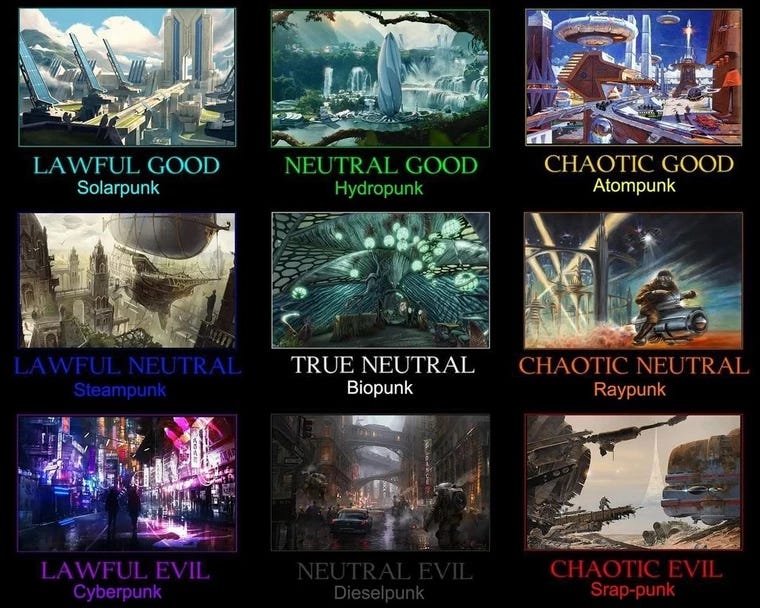

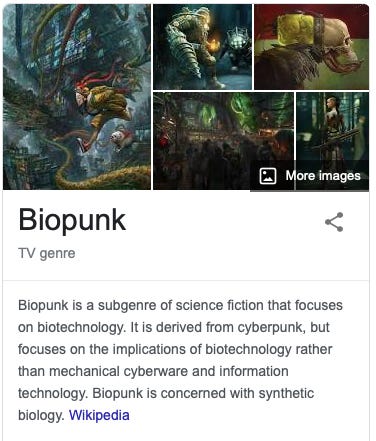
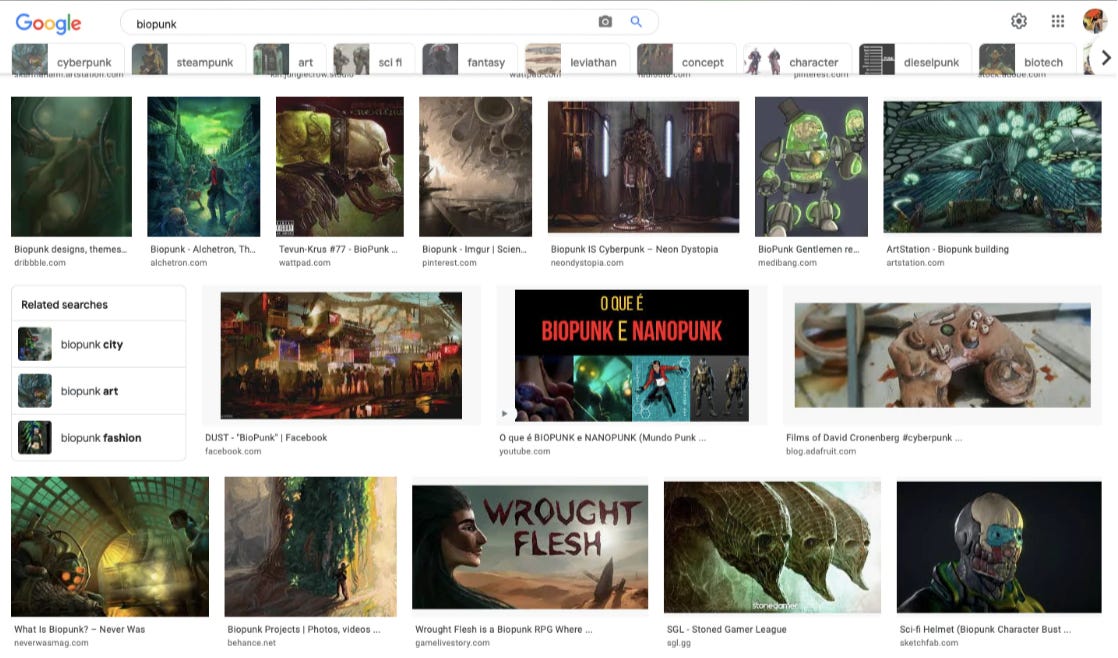


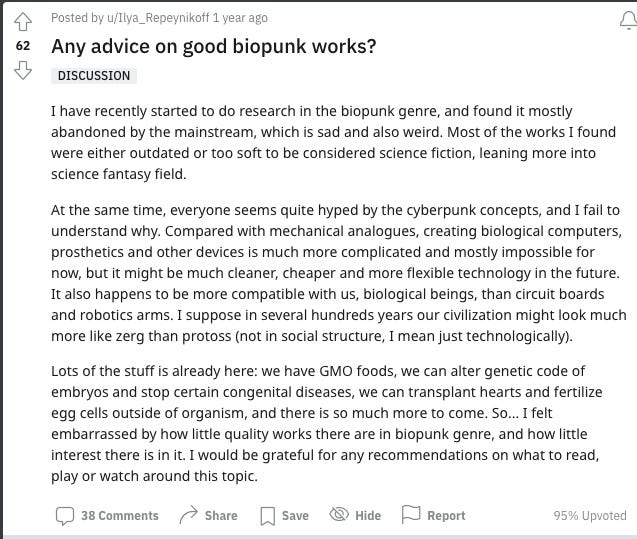
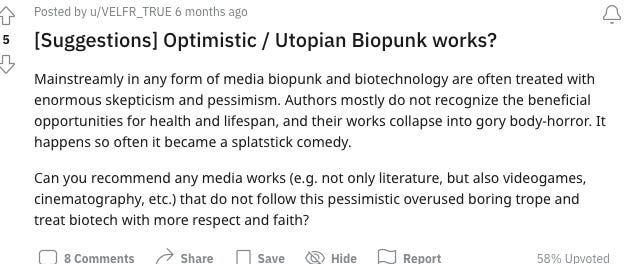
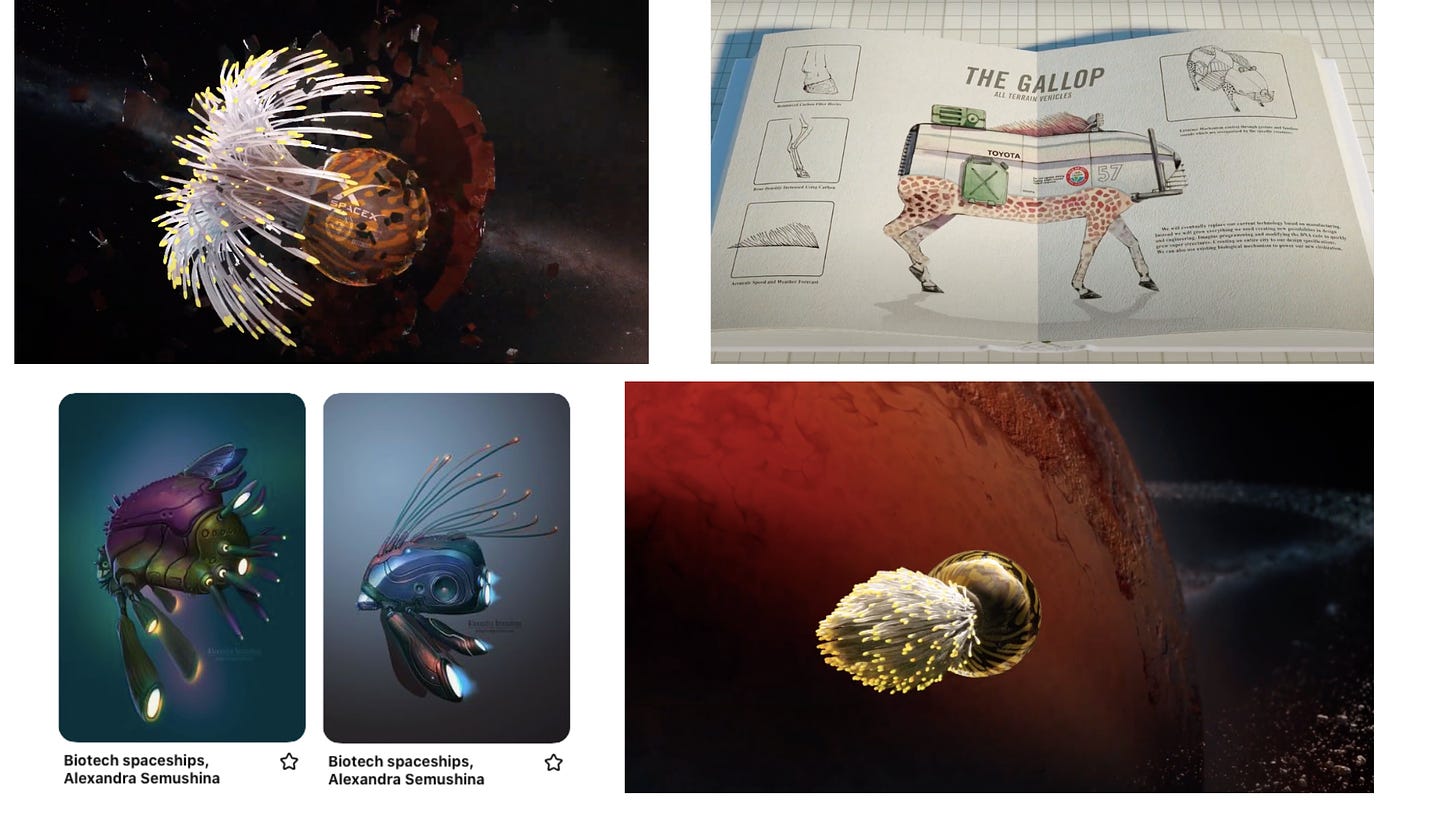
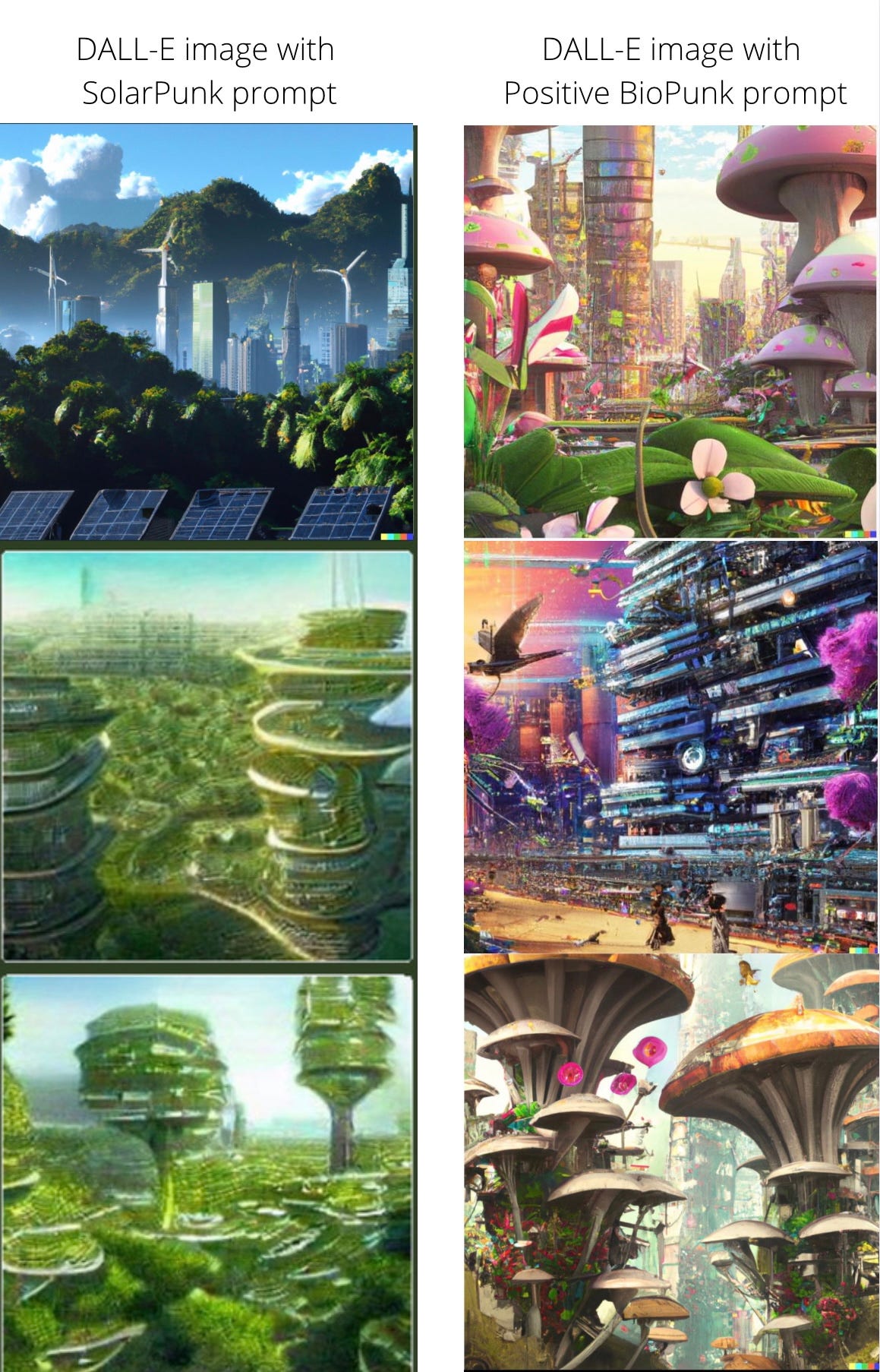

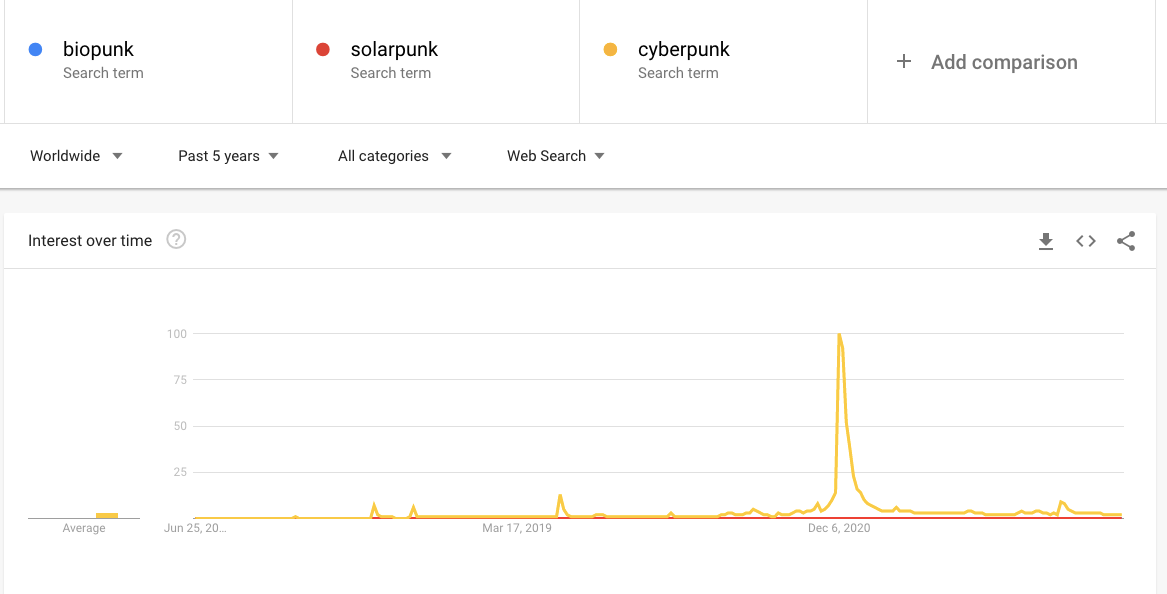

I'm totally with on this. Biopunk does need a more optimistic vibe since it's very likely to be our reality. We have the chance to build the future we want and it starts with building the right one in our imagination first.
I loved reading this! I agree that aesthetics are so influential these days. Very inspiring, looking forward to seeing what you create.